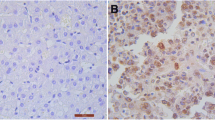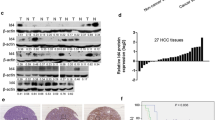Abstract
Background
As one of the most prevalent malignancies, hepatocellular carcinoma (HCC) ranks the third leading cause of cancer death worldwide. Due to the lack of biomarkers for early diagnosis, the clinical outcome of HCC remains unsatisfied with the current common therapeutic approaches, including surgery and chemotherapies. Thus, sensitive biomarkers and targeted therapies are in great need.
Aims
In this study, we explored and verified whether CDHR5 (cadherin-related family member 5), a cadherin family protein, could serve as the potential biomarkers for HCC in the clinic.
Methods
A retrospective study which contained 154 HCC patients was performed. Chi-square was utilized to analyze the relationship between CDHR5 expression and the clinicopathological features of HCC patients. The Kaplan–Meier method and Cox regression analyses were then used to evaluate the survival of HCC patients. In addition, cell proliferation assay and colony formation assay were performed to examine the effects of CDHR5 on the progression of HepG2 and Huh7 cells.
Results
IHC and RT-qPCR revealed that CDHR5 was downregulated in HCC tissues compared with adjacent liver tissues. In addition, CDHR5 expression was significantly correlated with tumor numbers, tumor size, and TNM stage. CDHR5 expression was then shown to be an independent risk factor for survival of HCC patients by survival analysis. In vitro experiments showed that CDHR5 suppressed the proliferation capacity of HCC cells.
Conclusions
Taken together, our study not only identified CDHR5 as a novel prognostic biomarker in HCC but also provided evidence that CDHR5 can inhibit HCC cell proliferation.



Similar content being viewed by others
References
Bray F, Ferlay J, Soerjomataram I, Siegel RL, Torre LA, Jemal A (2018) Global cancer statistics 2018: GLOBOCAN estimates of incidence and mortality worldwide for 36 cancers in 185 countries. CA Cancer J Clin 68(6):394–424. https://doi.org/10.3322/caac.21492
Zhang Y, Jia QA, Kadel D, Zhang XF, Zhang QB (2018) Targeting mTORC1/2 complexes inhibit tumorigenesis and enhance sensitivity to 5-flourouracil (5-FU) in hepatocellular carcinoma: a preclinical study of mTORC1/2-targeted therapy in hepatocellular carcinoma (HCC). Med Sci Monit 24:2735–2743. https://doi.org/10.12659/msm.907514
Wang X, Zhang Q, Wang Y, Zhuang H, Chen B (2018) Clinical significance of ubiquitin specific protease 7 (USP7) in predicting prognosis of hepatocellular carcinoma and its functional mechanisms. Med Sci Monit 24:1742–1750
Bruix J, Sherman M (2011) Management of hepatocellular carcinoma: an update. Hepatology 53(3):1020–1022
Takeichi M (1991) Cadherin cell adhesion receptors as a morphogenetic regulator. Science 251(5000):1451–1455
Liu H, Zhang Q, Li K, Gong Z, Liu Z, Xu Y, Swaney MH, Xiao K, Chen Y (2016) Prognostic significance of USP33 in advanced colorectal cancer patients: new insights into β-arrestin-dependent ERK signaling. Oncotarget 7(49):81223
Hazan RB, Qiao R, Keren R, Badano I, Suyama K (2004) Cadherin switch in tumor progression. Ann N Y Acad Sci 1014(1):155–163
Wang C, Yu G, Liu J, Wang J, Zhang Y, Zhang X, Zhou Z, Huang Z (2012) Downregulation of PCDH9 predicts prognosis for patients with glioma. J Clin Neurosci 19(4):541–545
Li Z, Chim JC, Yang M, Ye J, Wong BC, Qiao L (2012) Role of PCDH10 and its hypermethylation in human gastric cancer. Biochim Biophys Acta Mol Cell Res 1823(2):298–305
Zhong X, Zhu Y, Mao J, Zhang J, Zheng S (2013) Frequent epigenetic silencing of PCDH10 by methylation in human colorectal cancer. J Cancer Res Clin Oncol 139(3):485–490
Yu J, Koujak S, Nagase S, Li C, Su T, Wang X, Keniry M, Memeo L, Rojtman A, Mansukhani M (2008) PCDH8, the human homolog of PAPC, is a candidate tumor suppressor of breast cancer. Oncogene 27(34):4657–4665
Goldberg M, Peshkovsky C, Shifteh A, Al-Awqati Q (2000) μ-Protocadherin, a novel developmentally regulated protocadherin with mucin-like domains. J Biol Chem 275(32):24622–24629
Woo YM, Shin Y, Hwang JA, Hwang YH, Lee S, Park EY, Kong HK, Park HC, Lee YS, Park JH (2015) Epigenetic silencing of the MUPCDH gene as a possible prognostic biomarker for cyst growth in ADPKD. Sci Rep 5:15238. https://doi.org/10.1038/srep15238
Losi L, Grande A (2014) Involvement of mu-protocadherin in colorectal carcinogenesis: a promise for clinico-pathological evaluation. Histol Histopathol 29(1):11–19. https://doi.org/10.14670/hh-29.11
Montorsi L, Parenti S, Losi L, Ferrarini F, Gemelli C, Rossi A, Manco G, Ferrari S, Calabretta B, Tagliafico E, Zanocco-Marani T, Grande A (2016) Expression of mu-protocadherin is negatively regulated by the activation of the beta-catenin signaling pathway in normal and cancer colorectal enterocytes. Cell Death Dis 7:e2263. https://doi.org/10.1038/cddis.2016.163
Losi L, Parenti S, Ferrarini F, Rivasi F, Gavioli M, Natalini G, Ferrari S, Grande A (2011) Down-regulation of mu-protocadherin expression is a common event in colorectal carcinogenesis. Hum Pathol 42(7):960–971. https://doi.org/10.1016/j.humpath.2010.10.009
Hou S, Du P, Wang P, Wang C, Liu P, Liu H (2017) Significance of MNK1 in prognostic prediction and chemotherapy development of epithelial ovarian cancer. Clin Transl Oncol 19(9):1107–1116
Liu H, Xu Y, Zhang Q, Yang H, Shi W, Liu Z, Li K, Gong Z, Ning S, Li S (2017) Prognostic significance of TBL1XR1 in predicting liver metastasis for early stage colorectal cancer. Surg Oncol 26(1):13–20
Xu Y, Yang X, Li Z, Li S, Guo S, Ismail S, Liu H, Huang Z, Zhang Z, Chen Y (2017) Sprouty2 correlates with favorable prognosis of gastric adenocarcinoma via suppressing FGFR2-induced ERK phosphorylation and cancer progression. Oncotarget 8(3):4888
Xu YF, Liu HD, Liu ZL, Pan C, Yang XQ, Ning SL, Zhang ZL, Guo S, Yu JM (2018) Sprouty2 suppresses progression and correlates to favourable prognosis of intrahepatic cholangiocarcinoma via antagonizing FGFR 2 signalling. J Cell Mol Med 22(11):5596–5606
Liu H, Liu Z, Li K, Li S, Song L, Gong Z, Shi W, Yang H, Xu Y, Ning S (2017) TBL1XR1 predicts isolated tumor cells and micrometastasis in patients with TNM stage I/II colorectal cancer. J Gastroenterol Hepatol 32(9):1570–1580
Liu S, Chen L, Xu Y (2018) Significance of PYK2 level as a prognosis predictor in patients with colon adenocarcinoma after surgical resection. OncoTargets Ther 11:7625–7634. https://doi.org/10.2147/ott.s169531
Zhang Q, Fan H, Zou Q, Liu H, Wan B, Zhu S, Hu Y, Li H, Zhang C, Zhou L (2018) TEAD 4 exerts pro-metastatic effects and is negatively regulated by miR6839-3p in lung adenocarcinoma progression. J Cell Mol Med 22(7):3560–3571
Liu H, Xu Y, Zhang Q, Li K, Wang D, Li S, Ning S, Yang H, Shi W, Liu Z (2017) Correlations between TBL1XR1 and recurrence of colorectal cancer. Sci Rep 7:44275
Bujko M, Kober P, Statkiewicz M, Mikula M, Ligaj M, Zwierzchowski L, Ostrowski J, Siedlecki JA (2015) Epigenetic-mediated downregulation of μ-protocadherin in colorectal tumours. Gastroenterol Res Pract 2015:317093
Author information
Authors and Affiliations
Corresponding author
Ethics declarations
Conflict of interest
The authors declare that they have no conflict of interest.
Ethical approval
All procedures performed in studies involving human participants were in accordance with the ethical standards of the institutional and/or national research committee and with the 1964 Helsinki declaration and its later amendments or comparable ethical standards.
Informed consent
Informed consent was obtained from all individual participants included in the study.
Additional information
Publisher’s note
Springer Nature remains neutral with regard to jurisdictional claims in published maps and institutional affiliations.
Rights and permissions
About this article
Cite this article
Ding, X., Tian, X., Liu, W. et al. CDHR5 inhibits proliferation of hepatocellular carcinoma and predicts clinical prognosis. Ir J Med Sci 189, 439–447 (2020). https://doi.org/10.1007/s11845-019-02092-7
Received:
Accepted:
Published:
Issue Date:
DOI: https://doi.org/10.1007/s11845-019-02092-7




